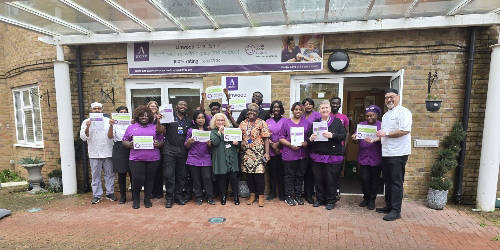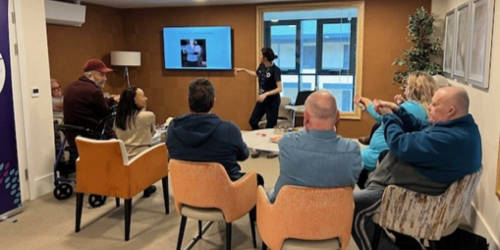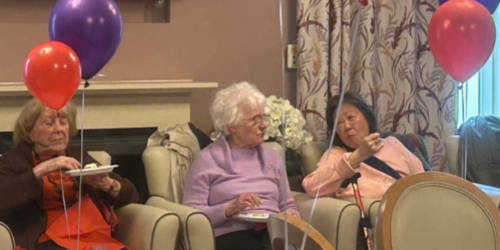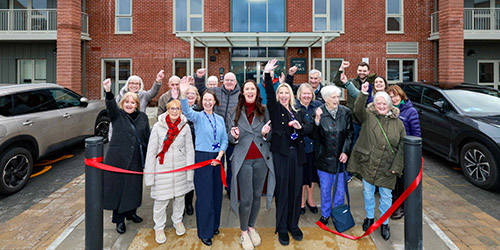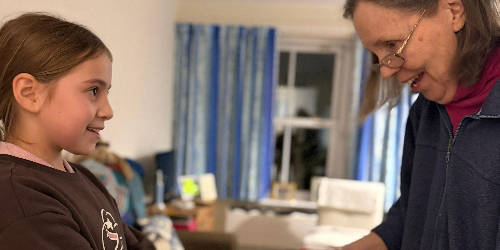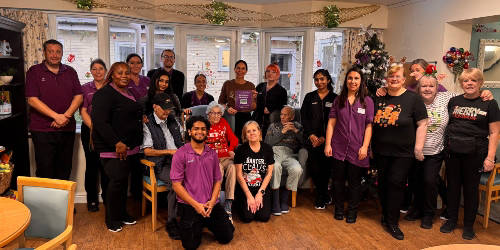- Home
- Media centre
- Press room
- Bring volunteers into care homes to improve quality of life says report
6 December 2022
Bring volunteers into care homes to improve quality of life says report
• Care home staff keen for volunteer support and cite benefits including improved job satisfaction and reduced levels of work stress
• Research finds volunteering in social care settings boosts wellbeing, mood, and cognitive function amongst residents
• New report sets out recommendations for care homes to build on the contribution of volunteering to improve quality of life.
Volunteering can play a vital role in improving both the working and living environment for staff and residents in care homes, claims a new report by Royal Voluntary Service.
The report, Reimagining Social Care – The Role of Active Citizenship, authored by Dr Julie MacInnes, Senior Research Fellow at the University of Kent and Dr Allison Smith, Head of Research & Insight at Royal Voluntary Service in partnership with Anchor – sets out to explore the contribution of volunteering to social care.
The study identifies well-designed volunteer roles can have significant benefits for residents, their family, and staff. Overwhelmingly, care home staff felt that volunteers add ‘a lot of value’ for residents (94%) and staff (85%). Half cited reducing pressure on colleagues as one of the top contributions of volunteers in social care with 49% stating they freed up colleagues to spend time on care tasks.
Almost all (98%) staff currently working with volunteers stated they ‘enjoy working with volunteers’ and 90% of staff not currently working with volunteers stated they would like to see more volunteers in care.
Those not currently working with volunteers identified companionship, mealtime support encouraging residents to eat and drink and leading on social activities as the main benefits they could provide.
For residents, the evidence highlights the key benefits of utilising well-designed volunteer roles as improved mood, cognitive function, and perceived improvements in the quality of care and greater family satisfaction with care. The main benefits for staff include improved job satisfaction and reduced levels of work stress.
Further findings suggest greater participation of volunteers in social care can support a new care model that puts the wellbeing of residents and staff at the centre. The report provides recommendations to care homes and the wider industry for using volunteering to enhance quality of care, support unpaid carers/families, improve staff morale and retention, and create a pipeline for the future workforce.
Data collected from both the UK public, and care home staff from Anchor, England’s largest not for profit provider of housing and care for older people, is highly supportive of the integrated model. Reporting not just a staff enthusiasm for volunteers but a public appetite to volunteer – despite or perhaps because of the well documented challenges facing the care sector.
According to the research, more than a third (38%) of adults would consider volunteering in a care home with 5% planning to do so. Interest is higher amongst younger generations, with 52% of those 18-34 years old saying they would consider volunteering in the sector, 18% of this age cohort because they are thinking about a career in care.
Catherine Johnstone CBE, CEO at Royal Voluntary Service said:
We owe those working in social care and those living in care more support. This report sets out the contribution of volunteering to social care, with a focus on care homes, and our recommendations for delivering on this. The pandemic and the cost-of-living crisis continue to disproportionately impact on this sector. We want to see the benefits that volunteering has afforded the NHS at this difficult time, in terms of extra staff and patient support, extended to social care. Volunteering in social care can drive a more enriching model of care putting the wellbeing of staff and residents at the centre.
Sarah Jones, CEO at Anchor said:
Social care is highly skilled and specialised and can provide enormous job satisfaction for those working in the sector. In addition to the service our colleagues provide, volunteers in our care homes play an important role in helping older people live fulfilling lives. Crucially, for a sector facing workforce challenges, we have a number of colleagues who began their careers with us as volunteers. I very much hope this report helps encourage more volunteering in the care sector to enhance the lives of the people we serve.
There are some challenges that need to be addressed, however. Nearly half of care home staff referenced a lack of clarity about volunteer roles and variation in how volunteers perform tasks.
Reimagining Social Care – The Role of Active Citizenship launches as Royal Voluntary Service continues its commitment to inspire and enable people to give the gift of voluntary service to improve the nation’s health and wellbeing, resilience, confidence and connections.
Beyond findings, the report outlines four recommendations to care homes for utilising volunteering to improve the social care experience for residents and staff:
1. To grow volunteer numbers through increasing public awareness and reducing barriers to volunteering in social care.
2. To build the demand for volunteers through greater engagement and awareness among staff on the role of volunteers within their workplace, and greater input from staff on volunteer training and roles/activities.
3. To maximise outcomes for residents and staff through structured programmes that include consistent volunteers, sustained & frequent levels of activities, and balance in sociable and practical duties.
4. To develop careers through well-designed volunteer programs that support volunteers’ progression into meaningful careers in social care
Following the undertaking of the research, Royal Voluntary Service aims work with communities to mobilise voluntary action at scale in this sector, and to help grow a diverse range of volunteering opportunities in care.
Reimagining Social Care – The Role of Active Citizenship is the fourth in the Kickstarting a Volunteering Revolution series of research-led reports by Royal Voluntary Service in which leading voluntary sector experts examine the future of volunteering. Previous reports have explored the barriers to volunteering among different groups, how volunteering can help counter health inequalities, and how it can improve social mobility.
Royal Voluntary Service is one of Britain’s largest volunteering charities with volunteers supporting thousands of vulnerable people and the NHS. The charity also works in local communities running home libraries, companionship support, Home from Hospital services and patient transport. Its Virtual Village Hall provides online activities and classes to promote wellbeing and keep people active.
To make a donation to support the charity’s work, visit here. For any volunteering opportunities at Anchor, visit here.
Read more from Anchor
This website uses cookies which track activity so that you get the best possible experience. By continuing to use this website we will assume you are happy and cookies will be set. You can change your cookie settings at any time.



